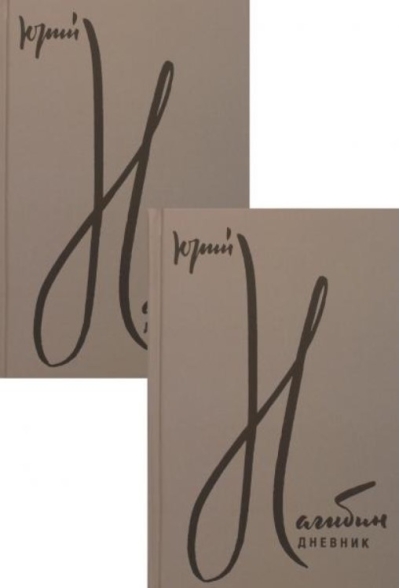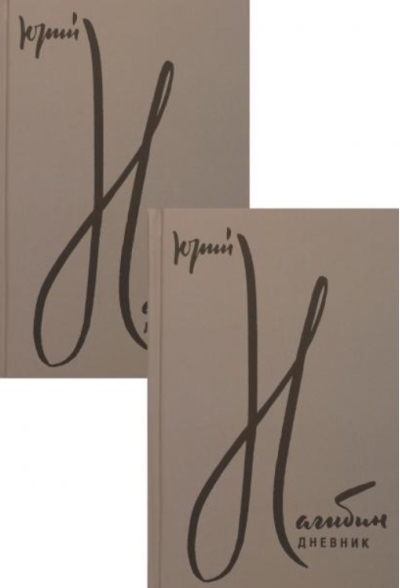Diary. In 2 volumes
39.99 €
The only thing available 2
For more than forty years (from 1942 to 1986), Yuri Markovich kept a diary. Shortly before his death, the writer personally gave it for publication, explaining that "the perfect sincerity and ruthlessness to himself of this half-diary-half-memoir may interest other people, for it helps self-discovery." Nagibin originally wrote the diary only for himself. "It's a conversation with myself, face to face," the author admitted, "sometimes an attempt to make sense of my own torturous mental life, sometimes just a blast, and it happens to be necessary. That is why his real non-fictional life is a most compelling story.
"My notes are mostly of a purely personal nature," says the author, "and I doubted for a long time - whether to publish them, especially in my lifetime. After all, this is a conversation with myself, what business is it of the readers. <...> My diary sometimes passes into memoirs, because it happened, I wrote not on a fresh trail, but on the memories, albeit not too long ago, events. Sometimes I have given dates, sometimes I have forgotten to do so. Occasionally, as I discovered only now, when I retyped the manuscript, events were reversed: the later ones preceded the earlier ones. I have not put the text in order, organized and edited it; to do so would deprive the diary of its immediacy and authenticity, which is perhaps its only virtue. The reader cannot help but feel that there is no literary calculation, no idea of realization, that he is dealing with the incorruptible truth of experience. I did not write out of obligation, but out of emotional compulsion. My writing is above all an impulse to vent. I grabbed my notebook when I felt I was short of air and, in order not to suffocate, spewed my experiences onto pages that no one would see but me, as I was sure they would. This is both the strength and the weakness of my book. Strength - in sincerity, weakness in the fact that many important things remained outside of it, because I am so strangely arranged that things objectively significant, I often almost, or even not touch ....
For fifty-five years of professional writing I have acquired readers who have remained faithful to me and in our unfavorable time for literature. My books are still sold out, regardless of whether the publisher gives circulation of thirty, fifty, one hundred and more thousand copies. So, these readers need me, and it is quite natural that they will want to see the true face of the author, remaining in the shadow of fiction tricks".
"Diary" Yuri Markovich is not just a memoir, but a valuable historical document. Before us reveals a continuous series of cultural and socio-political events of the twentieth century. Nagibin describes his meetings with famous writers, directors, political figures, composers, musicians. Truthfully talks about the war, specifying: "It should be remembered that the war pages were written at the front, in a notebook, which is very easy to find, and with the seeming safety of the times at that time pulled on the "ten years without the right to correspondence". After the publication of "Diary" had the effect of a bomb exploded and caused a storm of controversy, because many of its characters were shocked by unflattering characteristics and unexpected revelations.
Nagibin's unfeigned honesty pays off: endearing Soviet era, he nevertheless criticizes it for totalitarianism and rigid censorship - cleverly, subtly and boldly. As Yuri Markovich himself said: frankly about everything, mercilessly about himself.
"My notes are mostly of a purely personal nature," says the author, "and I doubted for a long time - whether to publish them, especially in my lifetime. After all, this is a conversation with myself, what business is it of the readers. <...> My diary sometimes passes into memoirs, because it happened, I wrote not on a fresh trail, but on the memories, albeit not too long ago, events. Sometimes I have given dates, sometimes I have forgotten to do so. Occasionally, as I discovered only now, when I retyped the manuscript, events were reversed: the later ones preceded the earlier ones. I have not put the text in order, organized and edited it; to do so would deprive the diary of its immediacy and authenticity, which is perhaps its only virtue. The reader cannot help but feel that there is no literary calculation, no idea of realization, that he is dealing with the incorruptible truth of experience. I did not write out of obligation, but out of emotional compulsion. My writing is above all an impulse to vent. I grabbed my notebook when I felt I was short of air and, in order not to suffocate, spewed my experiences onto pages that no one would see but me, as I was sure they would. This is both the strength and the weakness of my book. Strength - in sincerity, weakness in the fact that many important things remained outside of it, because I am so strangely arranged that things objectively significant, I often almost, or even not touch ....
For fifty-five years of professional writing I have acquired readers who have remained faithful to me and in our unfavorable time for literature. My books are still sold out, regardless of whether the publisher gives circulation of thirty, fifty, one hundred and more thousand copies. So, these readers need me, and it is quite natural that they will want to see the true face of the author, remaining in the shadow of fiction tricks".
"Diary" Yuri Markovich is not just a memoir, but a valuable historical document. Before us reveals a continuous series of cultural and socio-political events of the twentieth century. Nagibin describes his meetings with famous writers, directors, political figures, composers, musicians. Truthfully talks about the war, specifying: "It should be remembered that the war pages were written at the front, in a notebook, which is very easy to find, and with the seeming safety of the times at that time pulled on the "ten years without the right to correspondence". After the publication of "Diary" had the effect of a bomb exploded and caused a storm of controversy, because many of its characters were shocked by unflattering characteristics and unexpected revelations.
Nagibin's unfeigned honesty pays off: endearing Soviet era, he nevertheless criticizes it for totalitarianism and rigid censorship - cleverly, subtly and boldly. As Yuri Markovich himself said: frankly about everything, mercilessly about himself.
See also:
- All books by the publisher
- All books by the author
- All books in the series Literary monuments of Russian life




